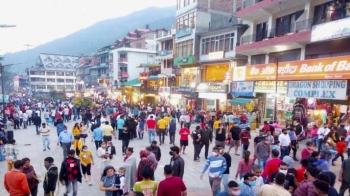
.png) Aarti
Aarti
.jpg)
The recent advisory by the Union Health Ministry in wake of violations of COVID norms reportedly observed in various parts of the country especially in hill stations, public transport and markets is timely and merits to be religiously adhered to in the right earnest. Expressing similar concern, the Prime Minister, too, has urged citizens to guard against complacency to prevent a third wave of the coronavirus spread. The Union Home Ministry has also advised States and Union territories to take strict action against officials responsible for ensuring compliance to guidelines
Since the beginning, that is, no sooner than the World Health Organisation declared COVID as a global pandemic, WHO has been urging that everyone should adopt individual strategies of infection prevention such as frequent and careful hand washing and social distancing. Such measures are said to have proved effective during the first wave of the pandemic in preventing the spread of the virus across vulnerable populations including elderly people, those with underlying health conditions or disabilities as also in reducing pressure on public health services.
In India, the Central Government’s guiding principles of COVID containment and management, namely the five-fold strategy - test-track-treat-vaccinate and adherence to COVID appropriate behaviour at all crowded places and potential super-spreader events – has been largely been successful in tackling the second wave amidst several challenges.
In several places in the country, several teams are said to be enforcing COVID appropriate behaviour in public places. We need to adhere to it and we simply cannot be self-satisfied on the decline in the number of COVID cases in the country and as rightly stated by experts does not indicate the end of the second wave. Notably enough, many people who had been infected with the dreaded virus and survived haven’t returned to their previous state of health. New research seems to suggest that even young people can be left with chronic health problems after infecting COVID.
As such, the lasting health problems that COVID may cause is simply unimaginable.
For instance, one-third of people with mild-to-moderate COVID in Sydney were left with persistent symptoms including fatigue and shortness of breath that lasted at least two months. More than 10% had impaired lung function.
Likewise, a study of COVID positive patients in the United Kingdom found that people who were hospitalised during the first wave were four times more likely to be readmitted to hospital and eight times more likely to die than a matched control group over an average follow-up period of four to five months. Notably, these people were particularly likely to develop diabetes, heart disease and kidney disease. Similarly, during the second wave, amongst people who contracted the virus only around 1% of children and 2-3% of young adults had to be hospitalised. More than 10% of those aged over 60 needed to go to hospital.
Although it was believed that vaccinating adults would suffice to reach herd immunity, outbreaks linked to schools in Israel suggests that children and adolescents as well needed to be inoculated for herd immunity.
Some countries adopted swift surveillance, quarantine and social distancing measures such as the use of face masks, closure of schools which helped to cut the transmission of COVID. A study of some 170 interventions in about 52 countries found that small measures like having two metre floor markings for social distancing worked wonders.
Let’s for a moment understand what happened in Israel. Following a vigorous vaccination drive, Israelis stopped wearing face masks and flouted all social distancing norms. But soon after a surge in COVID cases couple with the detection of the more infectious Delta variant, some of the COVID restrictions like mandatory wearing of masks indoors, quarantine for all people arriving in Israel etc., had to be reimposed
Some studies have shown that peers in particular can reinforce or undermine new habits because humans have a strong desire to fit in. Others seem to suggest that instead of strict rules, a better strategy at the macro level would be to emphasize the trust placed in citizens to do the right thing and to invoke the need for a collective effort.
Take the case of face masks. Although the emphasis on wearing masks is nothing new and has been in vogue to be safe from air pollution, like any behaviour, an individual’s decision to wear a mask or not is subject to several factors. While some may intrinsically wear them and others may not.
Would imposing fines make people comply with COVID appropriate behaviour? Will steep fines for not wearing face masks ensure proper mask usage?
Whatsoever be the reason for people not to wear masks, it is only when once the behaviour becomes a norm the ordinary citizen would inevitably feel it necessary to move out only with a mask.
Getting vaccinated and following COVID appropriate behaviour can go a long way in limping back to normalcy. However, to achieve success in the long-term determination to fight the virus, it needs to be appreciated that there is an imperative need in mass behaviour change to tackle the COVID.
Notwithstanding that many countries abroad seem to be planning to roll out a third booster dose so as to counter emerging variants, if guidelines are flouted even by a few people with impunity, it can pose grave and avoidable risks to not only themselves but also cause significant harm others.